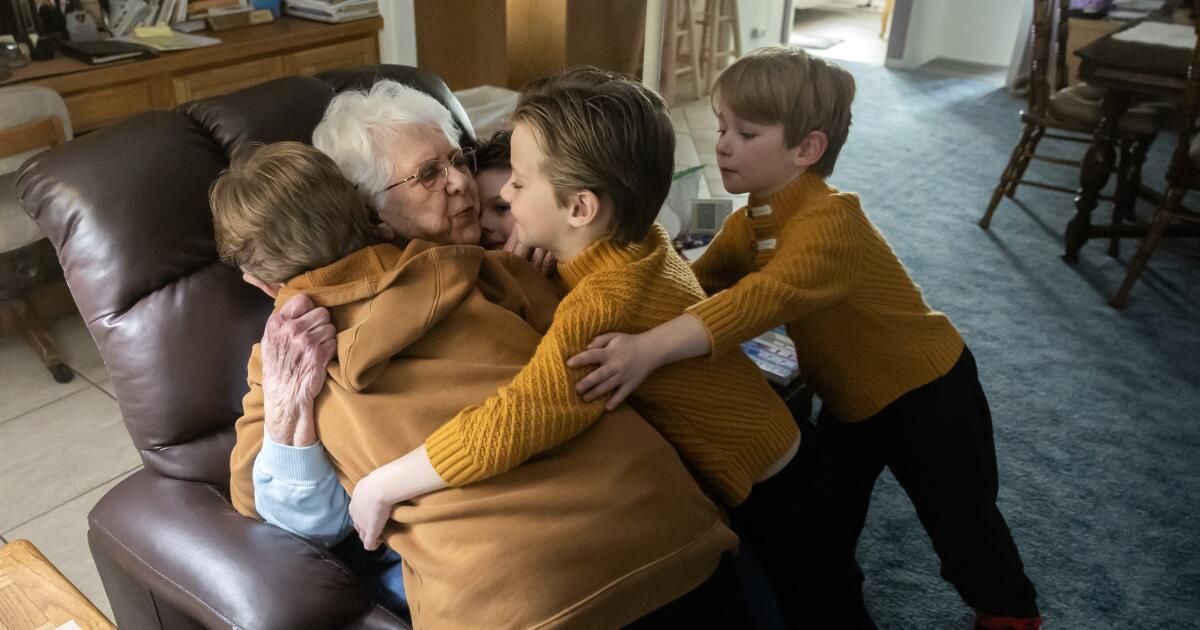The four children run into Eva Jablonsky’s quiet living room.
Missy, their mini poodle, marks her arrival with a chorus of barks, but her howls are soon drowned out by the cacophony of children.
Almost instantly, a new energy envelopes the 88-year-old’s home, a home that only three 7-year-olds and one 9-year-old can create. They sing an improvised version of Pete the Cat’s shoe song, talk to each other about who is the best soccer player (Lionel Messi is the GOAT, or “greatest of all time,” they decide), and compete for the The best place on the worn Jablonsky sofa.
“They are just the sweetest kids,” Jablonsky said, smiling as the four children (her sister is home sick this winter afternoon) greet her comfortably by her first name.
Jablonsky, who is hard of hearing, often misses some of the boys’ chats, but is happy to sit back and enjoy their antics, absorbing the carefree joy they seem to radiate.
“I love it, I love it,” said Jablonsky, a retired Los Angeles County sheriff’s deputy who now rarely leaves the house because of her unsteady feet. “I’m a social person and I miss people coming in and out of my house.”
That’s precisely the goal of a new program at Wrightwood Elementary School that aims to connect students with their older neighbors, not only to give them much-needed company during the country’s current loneliness epidemic, but also to give Elders another support system and maybe even a lifeline as the San Bernardino County mountain town faces increasingly extreme weather.
On top of all that, there are also proven health benefits for older people playing with young children.
The agreement has formally cemented the relationship between Jablonsky and Michelle Zamora’s family of seven: her second-grade quadruplets, her fourth-grade son and her husband.
Wrightwood Elementary School’s Golden Raccoon program has families “adopt” seniors into the community.
(Myung J. Chun / Los Angeles Times)
The Golden Raccoon program, a play about the school’s mammal mascot, “was really born last winter,” said director John Garner. “For at least a week, many of us were housebound… I was struggling to get all that snow out, and I can’t imagine being 80 or 90 years old.”
It was last winter when a historic blizzard hit the mountains of Southern California and buried numerous communities, including Wrightwood, under feet of snow.
Many people were without power for days and it took even longer for snowplows to clear many roads. While Wrightwood fared comparatively better than other mountain towns, the storms wreaked havoc on the San Bernardino peaks, damaging homes and trapping residents, some of whom were later found dead.
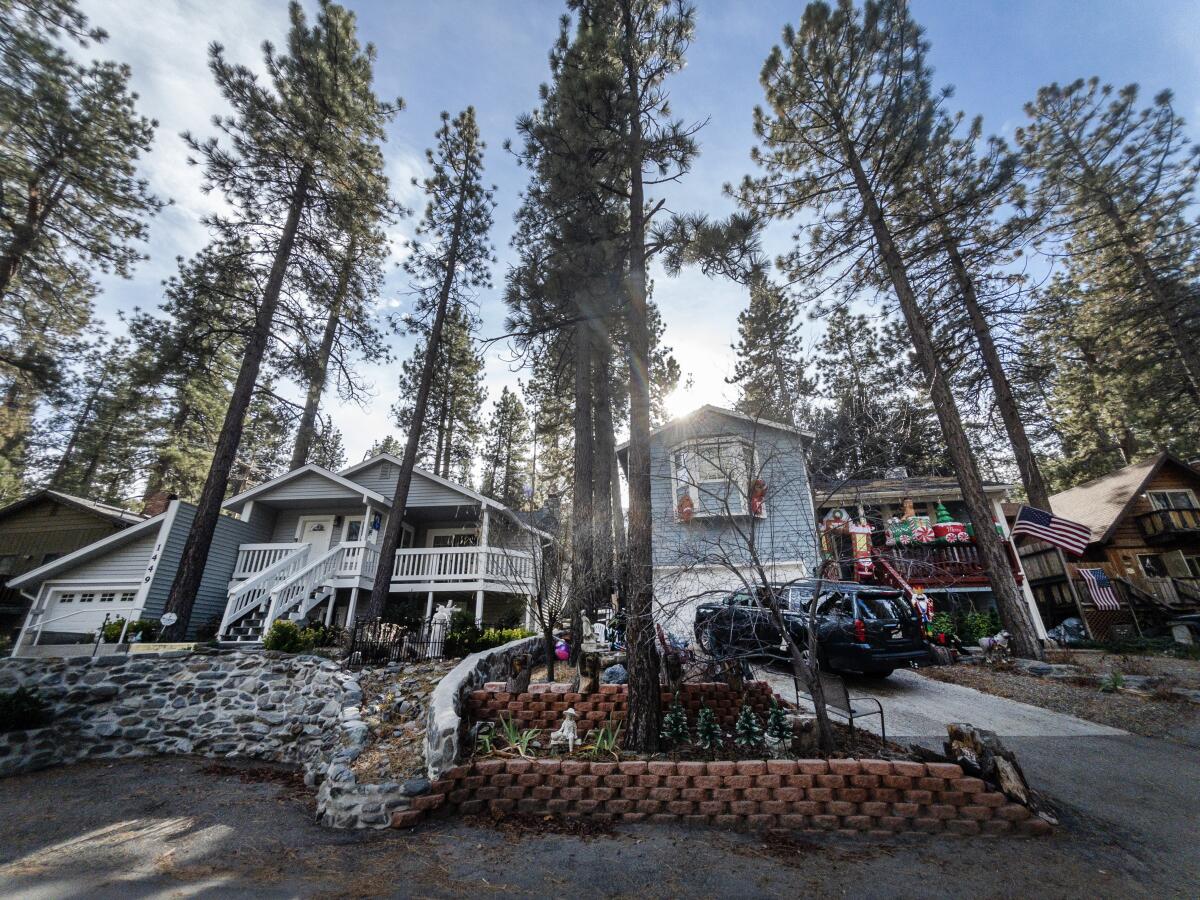
The Zamora family, in the house on the right, adopted their older neighbor Eva Jablonsky, who lives in the house on the left, as part of Wrightwood Elementary School’s Golden Raccoon program.
(Myung J. Chun / Los Angeles Times)
“It made me think about how we could, as a school, build a system or a network where these seniors are monitored,” Garner said.
And so the Golden Raccoon program was born, with 35 local families who will “adopt” an elderly neighbor in 2023. The hope is that even more will join in the coming months.
“When times are calm, you can bring them dinner, invite them to dinner or go play with them,” Garner said. “But then when there’s a crisis, whether it’s a big snow storm or we’ve had power outages… make sure you check your Golden Raccoon.”
The concept is not new. Students across the state have participated in similar programs, and even charities around the world have fostered these types of intergenerational relationships.
But it’s particularly pertinent in Wrightwood. About 30% of the 4,400 people who call this 6-square-mile community home are 65 or older, a rate twice as high as the state figure and significantly higher than San Bernardino County’s other mountain communities, according to the latest census data.
Requirements for the Golden Raccoon program are flexible, Garner said, and families have the option of reaching out to a neighbor, friend or even a family member. For the Zamoras, it was an easy choice, as they have been close to Jablonsky since the family moved next door in 2017.
“She was our Golden Raccoon before they were called Golden Raccoons, but we hope more people get the message to check on her. [their neighbors]especially here,” Zamora said.
In just the last few years, he said, they’ve faced floods, fires and snowstorms, which is challenging enough for anyone living alone, but especially for someone who might have mobility issues or not be proficient with technology. They make sure to always shovel Jablonsky’s driveway when it snows, Zamora said, and provide him with relevant information when the power or cell service goes out.
In the warmer months, Jablonsky often sits on his front porch watching the family’s five children ride bikes or play sports. But it’s harder to stay connected when temperatures drop, the retired detective said.
That’s why visits have become a highlight, whether to get help from his personal “tech support,” 9-year-old Jax, or to exchange Christmas gifts with family.
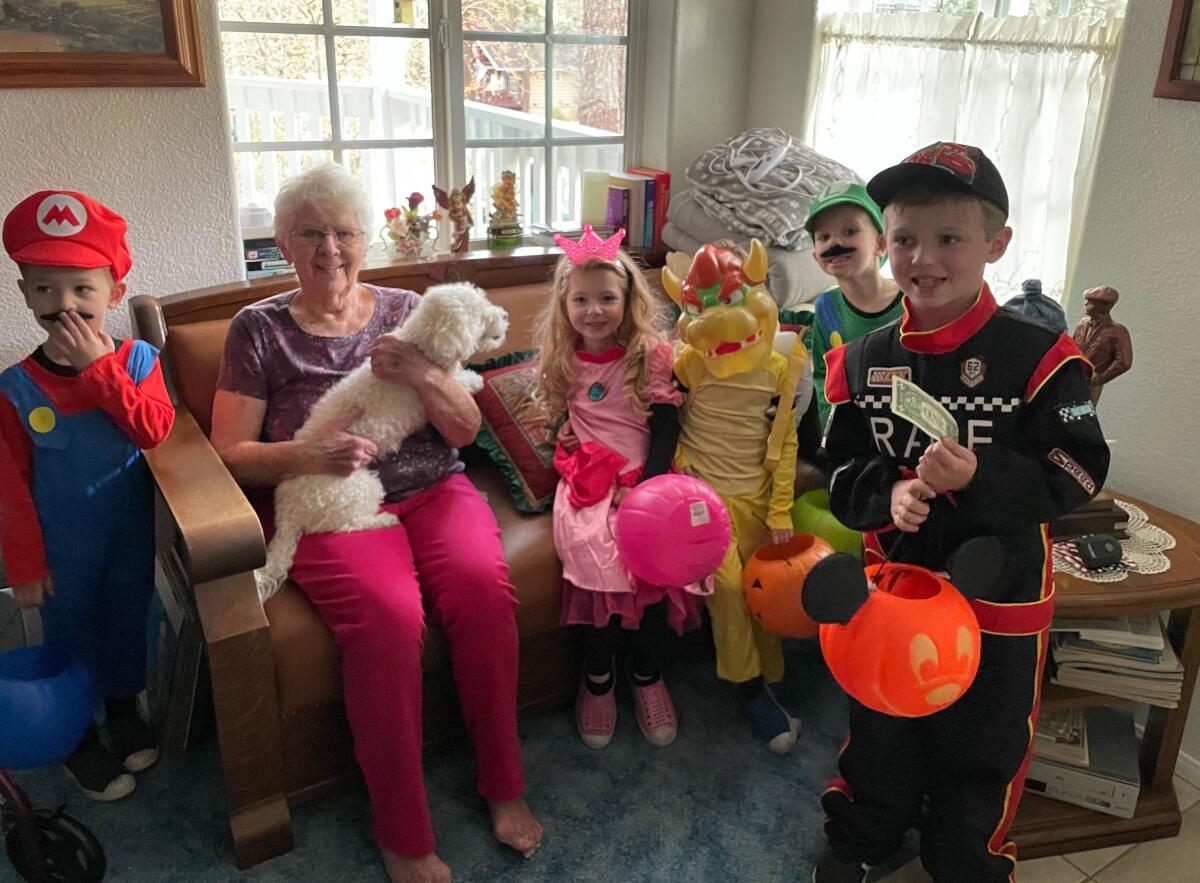
The five Zamora children visit Eva Jablonsky on Halloween.
(Michelle Zamora)
“These are my adopted grandchildren,” Jablonsky said, sitting Jax on her lap as three of the four quadruplets crowded around her feet. She tells them that she had a small farm in Rowland Heights, with goats and chickens, before moving to Wrightwood.
The children are fascinated by that idea.
“It would be so fun to meet chickens,” said Mason, 7, who was wearing a matching yellow sweater with his fellow quadruplets.
“If I had a farm, I would have 100 dogs!” Jax added. “And then I would have cats to eat the mice.”
Evan and Drew, the other younger brothers, chime in: “What if mice are faster than cats?”
Then: “Mason is a mouse!”
The boys laugh. Jablonsky and his mother can’t help but bond.
Other Wrightwood families are forging new relationships with elderly neighbors they somehow have never met, even in the small town. The show connected Chris Hirschman and his four children, three of whom are students at Wrightwood Elementary School, with a woman who recently lost her husband to cancer. They have tried to provide new bright spots in her life, Hirschman said.
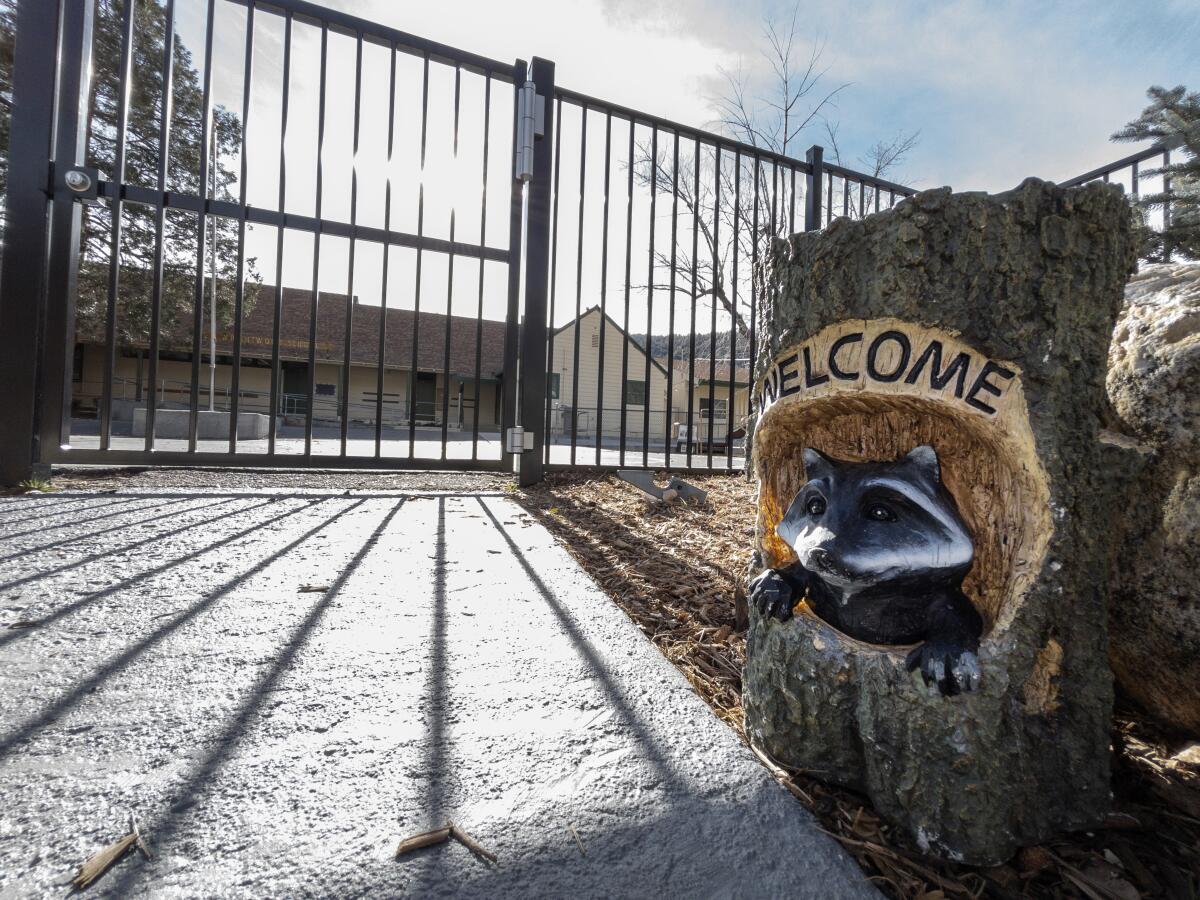
The Golden Raccoon program was created by the principal of Wrightwood Elementary School, whose mascot is a raccoon.
(Myung J. Chun / Los Angeles Times)
“We are getting to know her,” he said. Her children have enjoyed playing with her dogs and this holiday season they gave her homemade Christmas cookies and an ornament. When the family realized his golden raccoon didn’t have a tree, the Hirschmans quickly remedied it and gave him a new conifer.
“It’s the community helping itself,” Hirschman said. “We have a lot of people who could use a little help, sometimes just a hello, just a visit.”
Her daughter Dorothy, 8, has especially liked her Golden Raccoon and was hoping to spend part of New Year’s Eve with her, perhaps watching a movie.
“I think she would really like that,” Dorothy said.
Garner and the families involved are hopeful the program will continue to expand and are working to find ways for seniors to request a partner, as well as include Golden Raccoons in school events, such as talent shows, assemblies and story time.
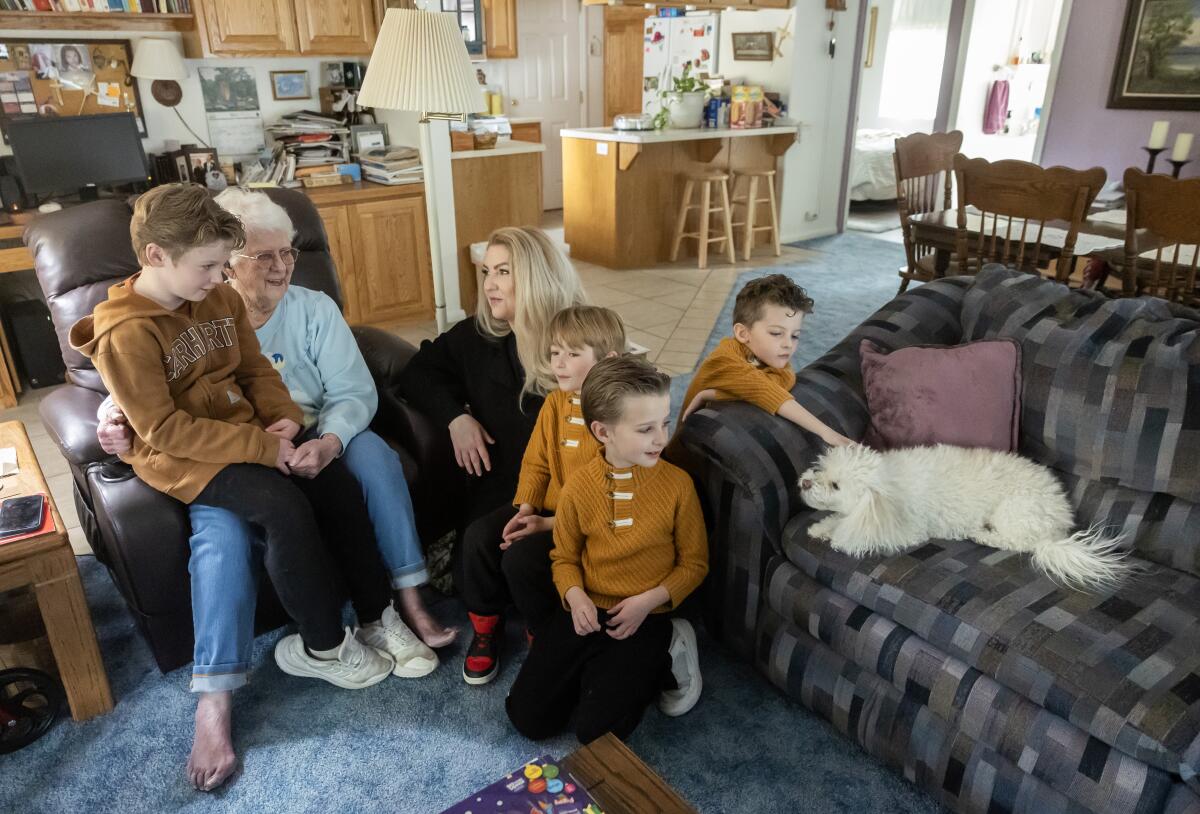
The Zamora family: Jax, 9 years old, left; mom Michelle; Drew, 7; Evan, 7, and Mason, 7, visit their “adopted” neighbor Eva Jablonsky.
(Myung J. Chun / Los Angeles Times)
“What we’re trying to instill in kids is that they have the power to make the world a better place,” Garner said.
It seems to be resonating.
Before the Zamora children leave Jablonsky’s house, each one gives him a big hug, placing their little bodies on his couch.
“She’s part of our family now, huh?” said Michelle Zamora. Her children have their own grandparents and Jablonsky has his own grandchildren, but there is something special about living so close and being able to share much of everyday life.
“I love you,” the boys say to Jablonsky as they huddle together.
“I love you too,” she replied. “Bye kids”.
“I’ll miss you,” Mason sings as he leaves.
Jablonsky smiles. He’ll probably miss them the most, but he knows they’ll be back, just never soon enough.

